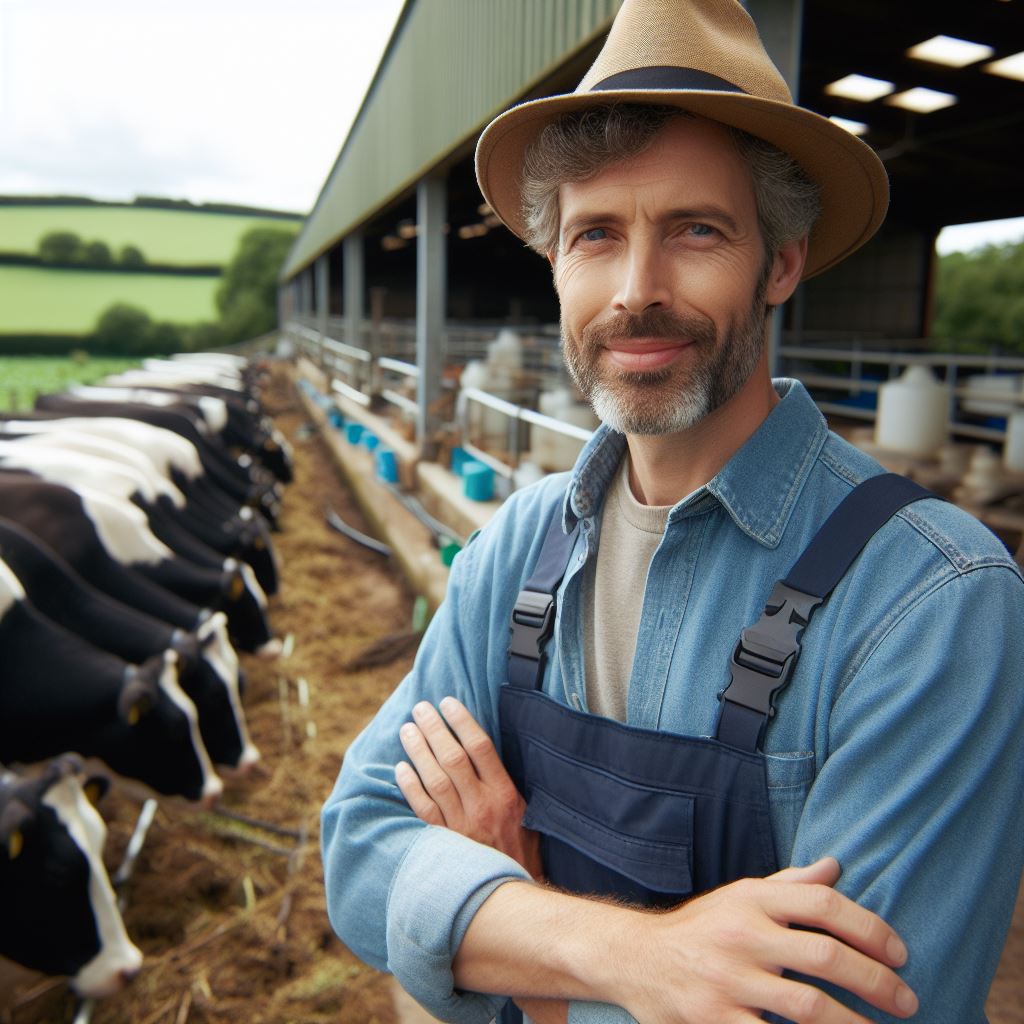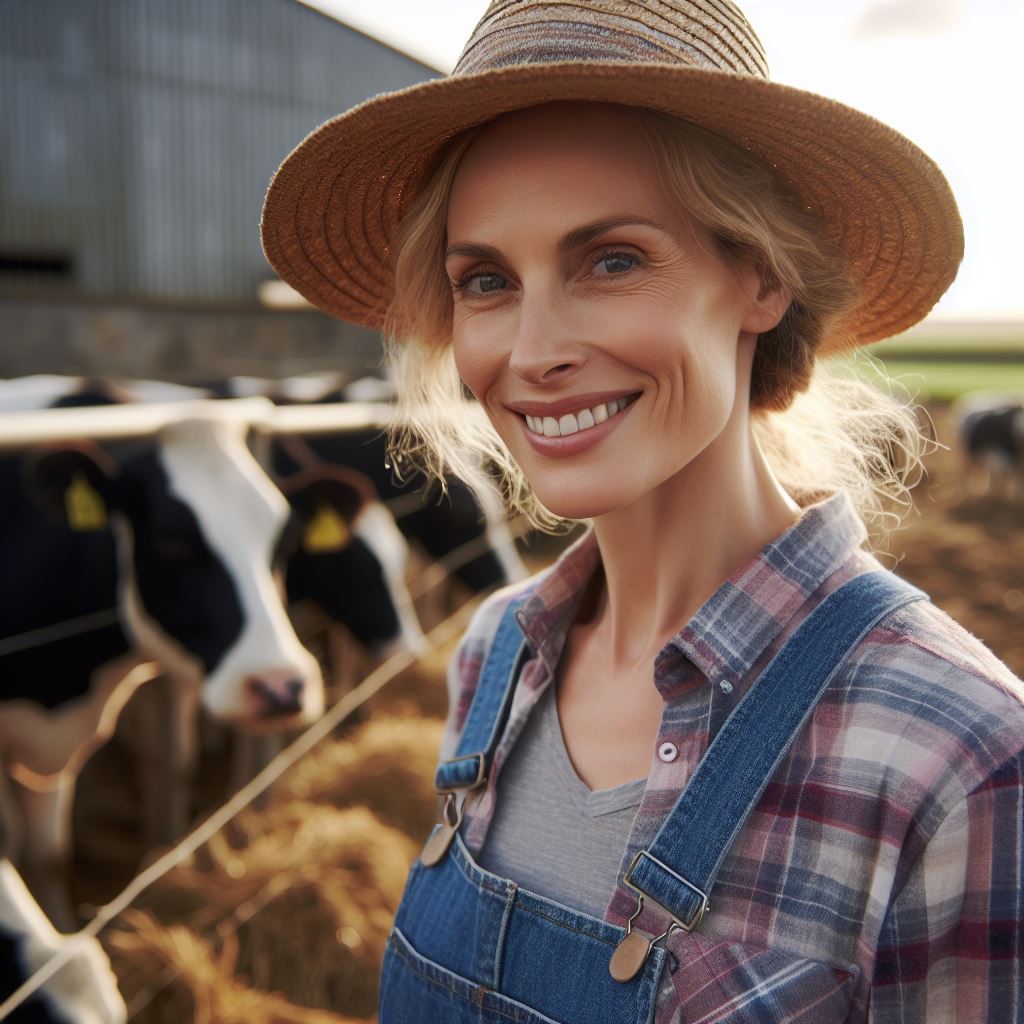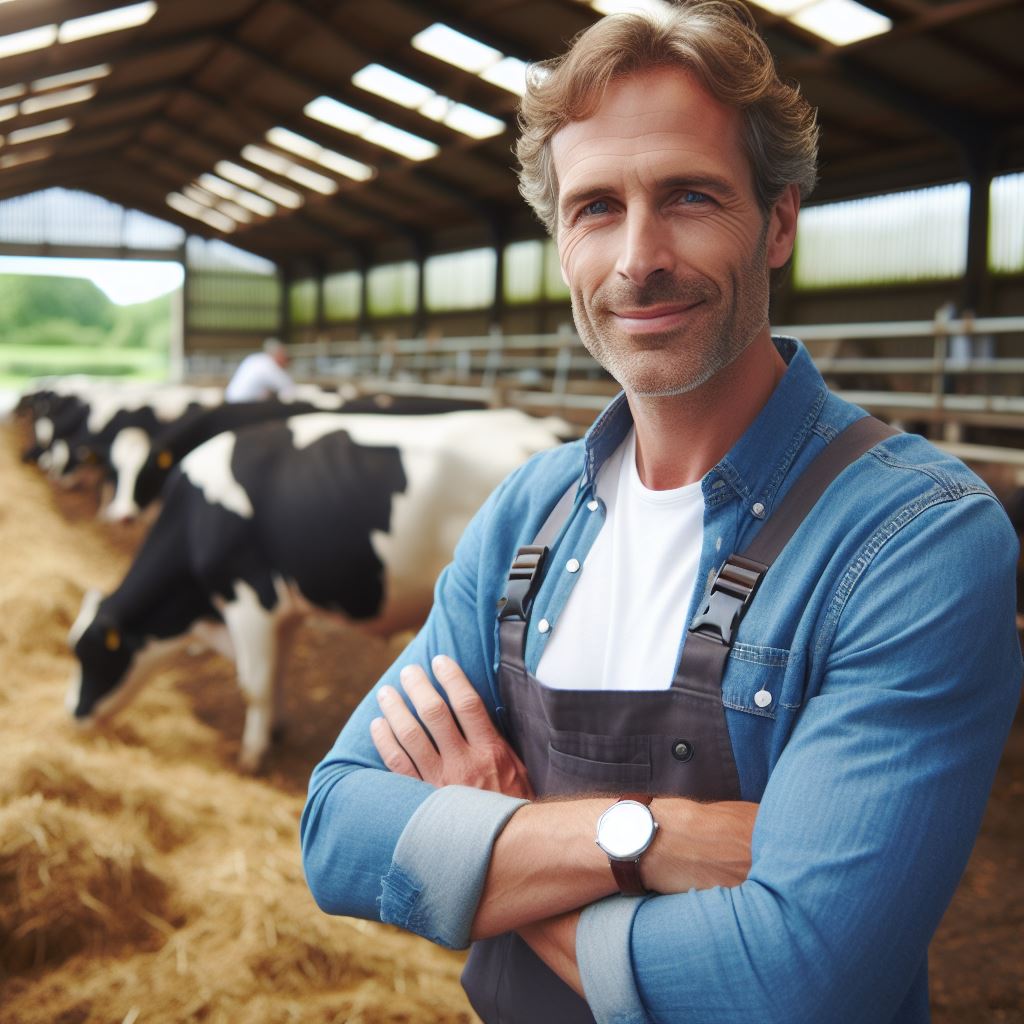Introduction
Technology has revolutionized the way we live and work, and the agricultural sector is no exception. In the UK, the introduction of agritech has had a significant impact on farm managers and the overall farming industry.
Farm managers play a crucial role in UK agriculture, overseeing daily operations, managing resources, and ensuring efficiency and profitability.
They are responsible for making informed decisions that can directly impact the success of the farm.
With the advent of agritech, farm managers now have access to a wide range of tools and technologies that can streamline their operations and optimize productivity.
These trends have the potential to drastically improve the efficiency and sustainability of UK farms.
One of the key agritech trends impacting farm managers is precision agriculture.
Through the use of GPS technology and sensors, farmers can collect data on soil quality, weather conditions, and crop health.
This data can then be used to make informed decisions, such as when to irrigate, fertilize, or harvest, resulting in reduced resource wastage and increased yields.
Another trend is the use of robotics and automation in farming operations.
This includes automated machinery and drones that can perform tasks such as planting seeds, monitoring crops, and applying pesticides.
These technologies not only reduce the reliance on manual labor but also improve accuracy and efficiency.
Furthermore, the Internet of Things (IoT) has enabled farm managers to have real-time access to data from various sources, such as weather stations, equipment sensors, and livestock tracking devices.
This allows for better decision-making and proactive management of farms.
Basically, the introduction of agritech has revolutionized the UK farming industry and greatly impacted farm managers.
These technologies have the potential to enhance efficiency, sustainability, and profitability, ensuring the continued success of UK agriculture.
Personalized UK Career Consulting
Receive tailored career guidance designed just for you. Get actionable steps and expert support to boost your career in 1-3 days. Take control of your career now.
Get StartedPrecision agriculture and its impact on farm management
Precision agriculture and its use of technology
The Precision agriculture is a trend that is revolutionizing farm management in the UK.
Through the use of technology, precision agriculture allows farmers to optimize their operations and make more informed decisions. One of the key components of precision agriculture is the collection of data.
Through sensors and drones, farmers can collect data on soil conditions, crop health, and weather patterns.
This data is then analyzed using advanced algorithms and software to provide insights and recommendations to farm managers.
Benefits of precision agriculture for farm managers
The benefits of precision agriculture for farm managers are numerous. Firstly, it allows for more accurate and targeted application of inputs such as fertilizers and pesticides.
By analyzing data on soil conditions and crop health, farmers can ensure that these inputs are applied only where and when they are needed, reducing waste and lowering costs.
Precision agriculture also enables farmers to better monitor their crops and identify any potential issues or diseases.
By using remote sensing technologies, farm managers can detect subtle changes in crop health and take proactive measures to address them, leading to higher yields and better quality produce.
Additionally, precision agriculture can help farm managers improve their resource management.
By analyzing data on weather conditions and soil moisture levels, farmers can optimize their irrigation practices to minimize water use while maximizing crop growth.
Examples of precision agriculture tools
Furthermore, precision agriculture tools and techniques have been developed specifically for different types of crops and farming practices.
For example, variable rate technology allows farmers to apply inputs at different rates depending on the specific needs of different areas within a field.
This can be especially useful for crops with varying soil types or levels of nutrient deficiencies.
Remote sensing technologies, such as satellite imagery and drones, can provide farm managers with valuable insights on crop health and growth patterns.
Your Dream Job Starts with a Perfect CV
Get a tailored CV and cover letter that captures your unique strengths and stands out in your industry. Let us help you make an unforgettable first impression.
Get StartedThese tools can also be used to create detailed maps of fields, helping farmers identify areas that may need specific attention or management practices.
In summary, precision agriculture is a game-changer for farm managers in the UK.
By harnessing the power of technology and data, precision agriculture allows farmers to optimize their operations, reduce costs, and improve yields.
Farm managers leverage a myriad of precision agriculture tools for informed decisions, staying competitive in the dynamic agricultural industry.
Read: Innovations in UK Farm Management Techniques
Automation and robotics in farm management
In today’s world, technology has permeated every industry, and agriculture is no exception.
The advent of agritech has brought about significant changes in the way farm managers operate. One of the most notable trends in agritech is the use of automation and robotics in farm management.
Introduction to automation and robotics in agriculture
Automation and robotics in agriculture refer to the use of technology and machines to automate and streamline various tasks on the farm.
This includes everything from planting and harvesting to monitoring crop health and managing livestock.
Advantages of using automation and robotics for farm managers
- Increased efficiency: Automation and robotics can perform tasks at a much faster pace and with greater precision than humans.
- Cost savings: By automating repetitive tasks, farm managers can reduce the need for manual labor and save on labor costs.
- Improved productivity: With automation, farm managers can produce higher yields and optimize the use of resources such as water and fertilizer.
- Enhanced safety: Robots can be used to perform dangerous tasks, reducing the risk of injuries to farm workers.
- Data-driven decision-making: Automation allows for the collection of real-time data, enabling farm managers to make informed decisions about crop management and resource allocation.
Applications of automation and robotics in farm management
Automation and robotics have found several applications in farm management, revolutionizing the way tasks are performed. Some of these applications include:
- Harvesting: Automated harvesting machines can efficiently and accurately pick fruits and vegetables, reducing labor costs and increasing efficiency.
- Seeding and planting: Robotic seeders and planters can ensure precise spacing and depth, resulting in higher crop yields.
- Livestock management: Automated systems can monitor the health and behavior of livestock, facilitating early detection of diseases and optimizing feeding processes.
- Drone technology: Drones equipped with sensors and cameras can provide valuable data on crop health, soil conditions, and irrigation needs.
- Autonomous vehicles: Self-driving tractors and equipment can perform tasks such as plowing, spraying, and fertilizing with minimal human intervention.
These applications of automation and robotics are transforming the role of farm managers.
They allow for greater precision, efficiency, and productivity, ultimately leading to improved profitability and sustainability in agriculture.
While there are clear advantages to embracing automation and robotics in farm management, it is important to acknowledge the potential challenges.
The initial investment costs can be substantial, and ongoing maintenance and technological updates may be required.
Optimize Your LinkedIn for Success
Boost your LinkedIn profile with a professional bio, keyword-rich headline, and strategic recommendations that attract recruiters. Stand out from the crowd and get noticed.
Optimize NowAdditionally, the integration of new technologies into existing farm systems may require retraining and adjustment for farm managers and workers.
Nevertheless, the benefits of automation and robotics in agriculture far outweigh the challenges.
Farm managers need to stay updated with the latest trends in agritech and embrace the opportunities presented by automation and robotics to ensure the long-term success and sustainability of their operations.
By leveraging the power of technology, farm managers can optimize their processes, improve their yields, and contribute to a more efficient and sustainable agricultural industry in the UK and beyond.
Read: Challenges Facing Today’s UK Farm Managers

Data analytics and farm management
In today’s fast-paced and highly competitive farming industry, data analytics plays a crucial role in the success of farm managers.
Data analytics refers to the process of gathering, analyzing, and interpreting large sets of data to uncover patterns, trends, and insights that can inform decision-making.
In the context of farm management, data analytics allows farm managers to make data-driven decisions and optimize their operations for better efficiency and productivity.
Importance of data analytics in today’s farming practices
The importance of data analytics in today’s farming practices cannot be overstated.
With the increasing availability of smart farming technologies and IoT devices, farm managers have access to a wealth of real-time data that can help them monitor and optimize various aspects of their operations.
By harnessing the power of data analytics, farm managers can gain valuable insights into crop growth patterns, soil conditions, weather forecasts, and more.
This enables them to make accurate predictions and forecasts, which in turn helps them optimize their planting, irrigation, and fertilizer application strategies for maximum yield.
How farm managers can utilize data analytics for decision-making
Furthermore, data analytics allows farm managers to monitor and manage risks more effectively.
By analyzing historical data and identifying patterns, they can anticipate potential pest outbreaks, crop diseases, or plant nutrient deficiencies, and take proactive measures to prevent or mitigate them.
To effectively utilize data analytics for decision-making, farm managers need access to advanced analytics tools and technologies.
One example is remote sensing, which involves using satellite or drone imagery to capture data on plant health, soil moisture, and other factors that impact crop yields.
Examples of data analytics tools and technologies used in farm management
Another example is precision agriculture, which utilizes GPS and sensor technologies to collect data on plant growth, soil composition, and other environmental factors.
This data can then be analyzed to optimize irrigation schedules, adjust planting densities, and even identify specific areas within a field that require special attention.
Farm management software platforms are also becoming increasingly popular among farm managers.
These platforms integrate with various data sources and provide comprehensive analytics dashboards that enable farm managers to visualize and analyze their data in a user-friendly manner.
With the help of these tools and technologies, farm managers can make informed decisions about when to plant, irrigate, harvest, or apply fertilizers.
They can also track the effectiveness of different farming practices and adjust their strategies accordingly.
Essentially, data analytics is a game-changer for farm managers in today’s agritech landscape. By leveraging the power of data, farm managers can optimize their operations, minimize risks, and maximize yields.
The availability of advanced analytics tools and technologies makes it easier than ever for farm managers to harness the full potential of data analytics and make data-driven decisions.
Read: A Day in the Life of a UK Forester
Discover More: UK Forestry: Laws and Regulations Guide
Sustainable farming through agritech
When it comes to sustainable farming practices, agritech has played a crucial role in transforming the agricultural landscape.
With the ever-increasing demand for food production and the need to reduce environmental impact, sustainable farming has become imperative.
Let’s take a closer look at the various aspects of sustainable farming practices and the role agritech plays in promoting sustainability in agriculture.
Overview of sustainable farming practices
Sustainable farming practices are all about balancing the economic viability of farming with social and environmental considerations.
It is about meeting the needs of the present generation without compromising the ability of future generations to meet their own needs.
Some common sustainable farming practices include crop rotation, organic farming, conservation tillage, precision agriculture, and water management strategies.
These practices aim to minimize the use of synthetic inputs, conserve natural resources, protect biodiversity, and reduce greenhouse gas emissions.
Role of agritech in promoting sustainability in agriculture
Agritech has revolutionized the way farmers manage their operations, making it easier to adopt and implement sustainable farming practices. Here are some ways agritech is promoting sustainability in agriculture:
- Precision farming: Agritech tools such as GPS, drones, and remote sensing enable farmers to precisely apply fertilizers and pesticides, reducing waste and environmental pollution.
- Data-driven decision-making: Through the use of sensors and data analytics, farmers can monitor and optimize resource usage, leading to more efficient and sustainable farming practices.
- Pest management: Agritech solutions offer advanced pest monitoring systems, helping farmers detect and control pests more effectively, reducing the need for harmful chemical pesticides.
- Water management: Agritech tools like moisture sensors and irrigation automation systems ensure optimal water usage, preventing water wastage and conserving this precious resource.
- Smart farming: Internet of Things (IoT) devices and connectivity enable farmers to remotely monitor and manage their farms, reducing energy usage and improving overall efficiency.
Examples of agritech solutions for sustainable farming practices
Several innovative agritech solutions have emerged that contribute to sustainable farming practices. Here are a few examples:
- Vertical farming systems: These systems utilize vertical space to grow crops indoors, using less land, water, and pesticides while maximizing yields.
- Precision irrigation: Technologies like drip irrigation and soil moisture sensors ensure water is supplied directly to the roots, minimizing water wastage.
- Automated weather stations: These stations provide real-time weather data, allowing farmers to make informed decisions about irrigation, planting, and pest control.
- Biopesticides and biofertilizers: These organic alternatives to chemical inputs enhance soil health and crop productivity while minimizing environmental harm.
- Mobile apps: Farmers can access valuable agricultural information, market prices, and weather forecasts through mobile apps, enhancing productivity and sustainability.
These are just a few examples of how agritech is enabling sustainable farming practices.
The combination of technology and farming not only boosts productivity and profitability but also ensures environmental stewardship and long-term sustainability.
In fact, the integration of agritech in farming practices has paved the way for sustainable agriculture.
By leveraging precision farming, data-driven decision-making, and innovative solutions, farmers can minimize their environmental footprint while meeting the global demand for food.
It is vital for farmers and farm managers to embrace these agritech trends to ensure a sustainable and prosperous future for the UK agricultural sector.
Read: Forestry Careers: Paths and Progressions
Discover More: Forestry Apprenticeships in the UK
Conclusion
Agritech trends have a significant impact on UK farm managers, revolutionizing the agricultural sector. These advancements have improved efficiency, productivity, and sustainability in farming operations.
Farm managers can now make data-driven decisions, optimize resources, and enhance crop yield.
Potential Future Developments in Agritech for UK Agriculture
The future of agritech holds exciting possibilities for UK agriculture. Advancements in precision farming, big data analytics, and robotics are expected to redefine the industry.
Smart sensors and drones will enable farmers to monitor crop health and detect issues promptly.
There will also be increased integration of artificial intelligence and machine learning to enhance predictive analytics and automate tasks.
Encouragement for Farm Managers to Embrace and Adapt to Agritech Trends
To thrive in the evolving agricultural landscape, farm managers must embrace and adapt to agritech trends.
By leveraging technology, they can streamline operations, reduce costs, and minimize environmental impact.
Farm managers must continuously learn and upskill to optimize agritech advancements, ensuring sustainable practices for UK farms’ future success.
[E-Book for Sale]
500 Cutting-Edge Tech Startup Ideas for 2024 & 2025: Innovate, Create, Dominate
$19.99 • 500 Tech Startup Ideas • 62 pages
You will get inspired with 500 innovative tech startup ideas for 2024 and 2025, complete with concise descriptions to help you kickstart your entrepreneurial journey in AI, Blockchain, IoT, Fintech, and AR/VR.




